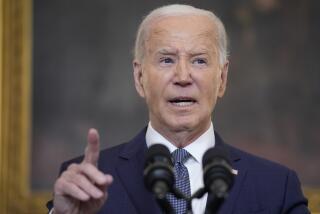Clinton to Take Case for Invasion of Haiti to Public
- Share via
WASHINGTON — President Clinton, armed with “very strong coalition” support in the United Nations, is preparing to go to the American people with his case for ousting Haiti’s military dictators by force unless they step down voluntarily, Leon E. Panetta, Clinton’s chief of staff, said Monday.
“The arguments are there,” Panetta said. “A military dictatorship in our back yard, impacting clearly on our policies . . . . affecting not only U.S. citizens but a huge number of Haitian refugees impacting on policies of our country. So for all those reasons, it is a matter of national interest in the United States.
For the record:
12:00 a.m. Aug. 3, 1994 For the Record
Los Angeles Times Wednesday August 3, 1994 Home Edition Part A Page 3 Column 5 Metro Desk 2 inches; 55 words Type of Material: Correction
Haiti address--White House Chief of Staff Leon E. Panetta did not explicitly state that President Clinton is planning to address the nation on the subject of Haiti, as The Times reported Tuesday as a result of an editing error. Panetta indicated, and other Administration sources confirm, that such an address might be given if the President decides to use force to oust the military regime.
“I think the President will get that message across to the American people,” beginning with a news conference scheduled for prime time Wednesday, Panetta said in an interview with The Times. A major address to the nation on Haiti also is being planned, he said.
Despite Panetta’s expression of optimism, Clinton faces growing opposition in Congress and continuing defiance from the military government in Haiti, as well as public opinion polls showing that most Americans are not convinced that sending U.S. troops to intervene in the Caribbean nation is necessary.
In Haiti, the ruling regime defiantly clamped “a state of siege”--a repression of civil rights akin to martial law--on its people. It was the government’s first reaction to the U.N. authorization of a possible U.S.-led invasion to restore ousted President Jean-Bertrand Aristide.
And in Washington, Senate Minority Leader Bob Dole (R-Kan.) introduced a resolution expressing the view that U.N. approval is not enough under the U.S. Constitution to permit an American invasion.
“Before invading Haiti, the United States has checked in with the United Nations Security Council, but I would also hope they check in with Congress,” Dole said. “International support is fine, but it is no substitute for the support of Congress and the American people.”
Dole made it clear, however, that the Clinton Administration would get no support from him if it did ask for congressional authorization. “There is no emergency in Haiti requiring the dispatch of American troops,” he said.
Madeleine Albright, U.S. ambassador to the United Nations, insisted Monday that the U.N. resolution, passed by the Security Council only a day earlier, had driven home a tough message to Lt. Gen. Raoul Cedras and his confederates in Haiti. Although they may have “some doubt in their minds about the timing,” she said, they now have “no doubts in their minds about the resolve to solve this situation.” She derided the Haitian government’s declaration of a state of siege as evidence that the military leaders “are getting very nervous.”
But Emile Jonassaint, the Haitian president installed by the military three months ago over worldwide protests, denounced the U.N. resolution as “arbitrary, iniquitous and in violation of international rights.”
“The whole world has declared war on Haiti,” Jonassaint, an 81-year-old former Haitian Supreme Court justice, said in a radio broadcast. “Seventy-nine years after the landing of U.S. Marines on our national soil, a threat of invasion and occupation of our country is in the works.”
Under Haitian law, a state of siege allows the military government to assume all civil powers, with the authority to ban public meetings, close newspapers and radio stations, search homes without warrants and impose a curfew.
Although Jonassaint announced the imposition of the state of siege Monday, Haiti--according to human rights monitors from the United Nations and the Organization of American States--has been operating for months with scant attention to laws. The monitors, who were expelled three weeks ago, accused the Haitian military and its allies of murdering, kidnaping and raping in a reign of terror against Aristide supporters.
Discussing Administration policy, Panetta said that “it would serve no purpose” for Washington to set a deadline for the dictators to resign, but he added: “Obviously the message is pretty clear. The message is that they should step down and if they don’t, we’re going to take action to make sure that they do. That’s not to say we aren’t going to continue to press them with sanctions and to press with other options.”
The United States has deployed more than 2,000 Marines on amphibious assault ships that are part of a flotilla of 14 U.S. warships near the British-governed Turks and Caicos Islands just north of Haiti. Argentine President Carlos Saul Menem has said that he would ask his Congress to authorize the dispatch of 600 troops to Central America and the Caribbean for possible use in a U.S.-led invasion. Some Caribbean countries are also expected to send small forces.
State Department spokesman Mike McCurry said the United States is making requests for other troops.
“I’m not going to spell these out,” he said, “but we have had very productive discussions within the hemisphere.”
The Clinton Administration also asked Israel to send troops, but Deputy Foreign Minister Yossi Beilin rejected the idea of offering forces.
McCurry ridiculed Jonassaint and the Haitian military commanders for proclaiming the state of siege at 3 a.m.--”the only time that the de facto government apparently can stomach the courage to address the citizens of Haiti.”
More to Read
Sign up for Essential California
The most important California stories and recommendations in your inbox every morning.
You may occasionally receive promotional content from the Los Angeles Times.










